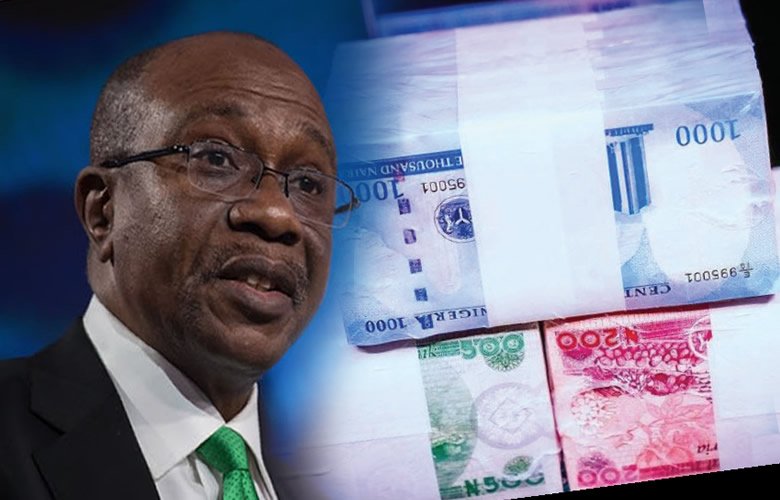The Central Bank of Nigeria (CBN) has said that it cannot print adequate naira notes to replace the old N200, N500 and 1,000 notes because the Nigerian Security Printing and Minting Plc (The Mint) is suffering from capacity constraints.

The CBN Governor, Godwin Emefiele, stated this on Friday when he briefed the emergency meeting of the National Council of State.
President Muhammadu Buhari convened the meeting to discuss issues of national importance among which is the threats posed by the shortage of naira.
Violent protests have been recorded in parts of the country, and the media is awash with lamentations of suffering Nigerians, who are not able to access their funds for transactions, especially in the cash-dominated informal economy.
Many banks in various states have shut down their operations as citizens violently protest their inability to access their funds.
Many governors have also echoed the lamentations of the citizens.
A Supreme Court decision this week asked that the deadline be further extended. The Attorney-General of the Federation, Abubakar Malami, is challenging that interim ruling by the Supreme Court and the central bank has not spoken on how it intends to comply with the ruling, thus leaving Nigerians confused.
Without a definite pronouncement by the federal government or the CBN, Nigerians have started rejecting the old notes, on-the-ground reporting across the country shows.
According to a report by an online medium, Premium Times,, the Mint has run out of paper to print N500 and 1,000 notes and is facing supply constraints., with a source adding that the minting company has placed orders with a German firm and De La Rue of the UK (for paper) but the orders are on a long waiting list so cannot be met now.
“The Mint had received CBN’s request to print 70 million copies of the new notes, totalling N126 billion to be pumped into circulation by today,” the source added, regretting, however, that the request could not be met because “the Mint doesn’t have the capacity.”
The Council of State has, however, thrown its weight behind the new Naira note policy, advising the CBN governor, Godwin Emefiele, to make new Naira notes available or recirculate old Naira notes to ease the suffering of Nigerians.
Briefing State House Correspondents at the end of the meeting, presided over by President Muhammadu Buhari, the governors of Taraba and Lagos states, Darius Ishaku and Babajide Sanwo-Olu; and the Attorney General of the Federation and Minister of Justice, Abubakar Malami, said the policy was accepted by members, but the implementation is a serious concern.
Governor Ishaku said: “The CBN was advised to make money available in quantum. The old money can also be recirculated to ease the suffering of the poorest of the poor.”
Governor Sanwo-Olu, on his part, said the chairman of the Independent National Electoral Commission (INEC), Mahmood Yakubu, and Inspector General of Police (IGP), briefed the Council on the state of preparedness for the 2023 general elections, and assured that they were fully prepared.
Malami said: “Relating to the Naira redesign policy, the policy stands but then the council agreed that there is need for aggressive action on the part of the CBN as it relates to the implementation of the policy by way of ensuring adequate provision being made with particular regard to the supply of the Naira in the system.”
The hybrid meeting which lasted for over four hours at the Council Chambers of the Presidential Villa, Abuja, had in attendance former heads of state and presidents, Gen. Yakubu Gowon (retd), Gen. Abdulsalami Abubakar (retd) and Goodluck Jonathan, while former President Olusegun Obasanjo, joined the meeting online.
Two former Chief Justices of the Federation, Alfa Belgore and Mahmud Muhammad, were also in attendance.
Speaking to journalists after a separate meeting with the president, Senate President Ahmad Lawan said that he informed Buhari that the National Assembly had resolved that there should be no cap on the currency swap policy because of the way the scenario is now playing out and how it impacts the constituents who make up their constituency.
He said, “For us in the Senate, initially we felt that this policy, in the first place, is not a bad one. But we also feel there is no need for a time limit; allow the old and the new to co-exist until the old notes are phased out.
“So, what is wrong in that? This is not going to be the first country to deploy it that way; other countries have been doing the same thing. And to say that in three months it will be okay, it is not okay, especially in a country like ours where maybe 80, 85, 90 percent of the population have no access to banks.”
According to him, when Britain changed its currency, it took mover year to change and the old notes remained legal tender.
“So, why ours? We are not cashless yet and that society is cashless already and they needed even more time. So, we should have an open-ended time but what will make it quick is for us to have more and and more of the new currencies and then they co-exist with the old ones until the old die a natural death,” Lawan said.
Last year, Central Bank of Nigeria introduced a policy of redesigning the Naira and gave an initial deadline of January 31, 2023 to completely phase out the 1000, 500 and 200 Naira notes.
Amid scarcity of the new notes and the inability of some Nigerians to deposit their old Naira in banks, the CBN extended the deadline to February 10, 2023, while President Buhari at a meeting with governors of the ruling All Progressives Congress on February 3 asked for seven days to fix the problem.
The failure to meet the seven-day ultimatum is coming amid reports that the Nigerian Security Printing and Minting Company has run out of paper and lacks the capacity the print the needed amount of new Naira notes.